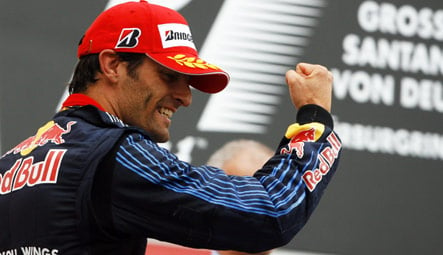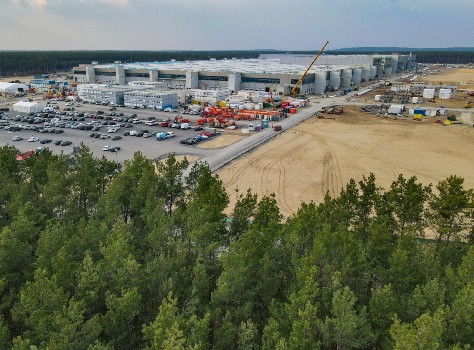Sunday’s German Grand Prix.
Webber, in his 130th F1 race after eight years in the sport, started from his first pole position and overcame a drive-through penalty for a first lap collision on his way to a spectacular win at the circuit in the Eifel mountains.
The 32-year-old driver from Queanbeyan, in New South Wales, came home 9.3 seconds clear of Vettel as he raced to a victory that threw the fight for the world championship wide open. Webber is third in the title race with 45.5 points behind leader Briton Jenson Button on 68 points and Vettel on 47. Brazilian Rubens Barrichello has 44 points and is fourth.
“It’s incredible,” he said. “I wanted to win so badly after Silverstone. The only thing I thought could beat me was the rain. I lost Rubens completely off the start and banged into him.
“It’s not normally my style, so I had to take a drive-through and recover from that. It’s a great day for me. It was a difficult winter, but I had great people around me and I thank them all.”
Vettel said: “Mark was unbeatable. I’m very happy with the result. It was quite a good recovery from quite a bad start.”
The two Red Bulls finished first and second ahead of Ferrari’s Felipe Massa of Brazil, who grabbed his first podium finish of the year, with German Nico Rosberg fourth for Williams.
Button battled through to finish fifth ahead of team-mate Barrichello, the Brawn pair resisting a late charge from two-times world champion Spaniard Fernando Alonso of Renault. Finn Heikki Kovalainen came home eighth for McLaren Mercedes.
Defending world champion Briton Lewis Hamilton finished 18th and last after a hot-headed attack on the opening lap saw him involved in a collision with Webber’s Red Bull that cost him a puncture.
Webber bashed into Barrichello’s car on the run from the start to the first corner, a collision for which he was punished with his drive-through penalty, but he overcame that with a dazzling drive to victory.
Barrichello, who led at the end of the first lap, could not believe that his team tactics cost him not only a victory, but a podium position. Asked what went wrong, he said: “I guess the strategy… it was a good show from the team on how to lose a race today. I’m terribly upset with the way things went. I did all I had to do. I went first on the first corner and then they made me lose the race.”
Watched by his father Alan, a motor cycle dealer in Australia, Webber romped to a triumph that ended Australia’s long wait for another winner since Alan Jones won at Las Vegas in the 1981 United States Grand Prix.
As he completed his final lap, Webber screamed with joy: “Yeah, yeah, yeah.” he screeched aloud. “Oh yes. You beauty! Yes.”
And his team-boss Christian Horner said: “Mark Webber – you are a Grand Prix winner. Well done. You did it!”
On a much warmer day, under a cloudy sky, the race started with high drama when Webber, from his first pole position, was marginally slower off the line than Barrichello and steered to his right to bump cars and push the Brazilian towards the barriers.
It was a solid knock, but not enough to slow the Brawn car which pulled away to lead into the first corner ahead of the Australian while another spectacular incident saw Hamilton flying off the track.
The defending champion, from fifth, applied his KERS to pass almost everyone into the Castrol S curve, but out-braked himself in a vain attack to stay on the circuit. In the process, he collided with part of the left-front wing of Webber’s Red Bull and picked up a right rear puncture.
This impetuosity, in effect, ended Hamilton’s race as he was forced back to the pits, from 20th and last, for new rubber – swapping his super-softs for a harder compound.



 Please whitelist us to continue reading.
Please whitelist us to continue reading.
Member comments